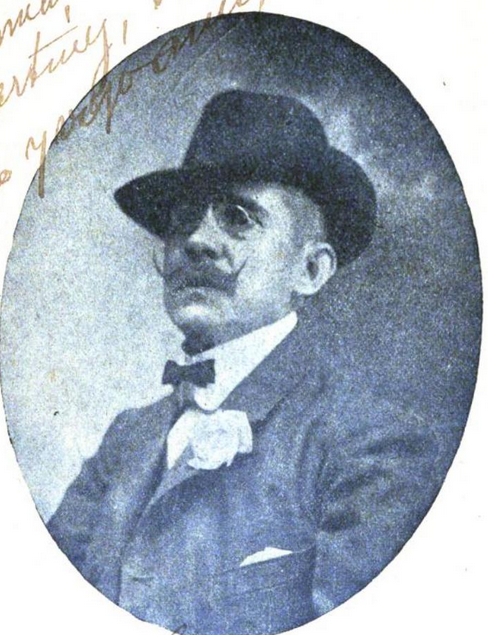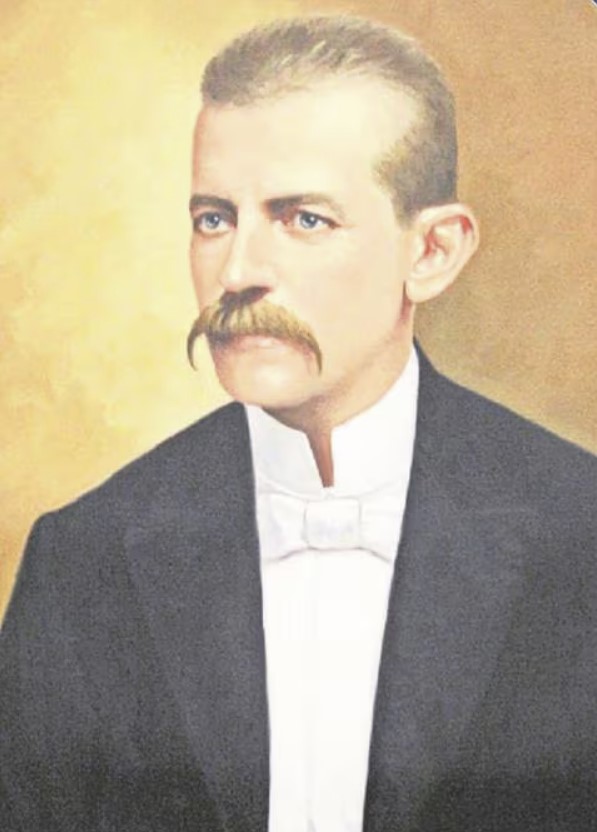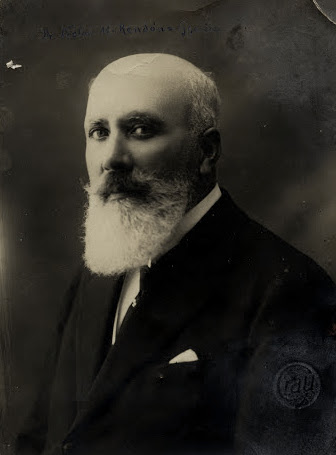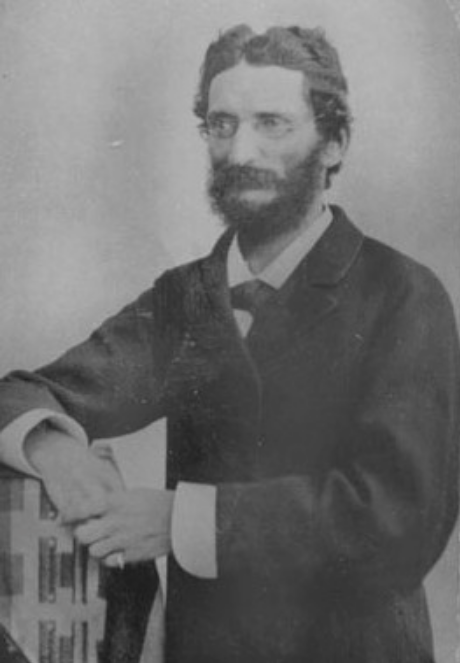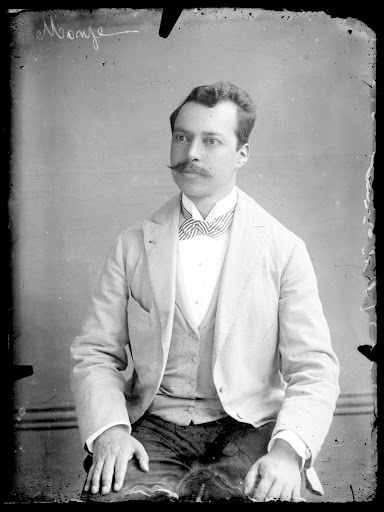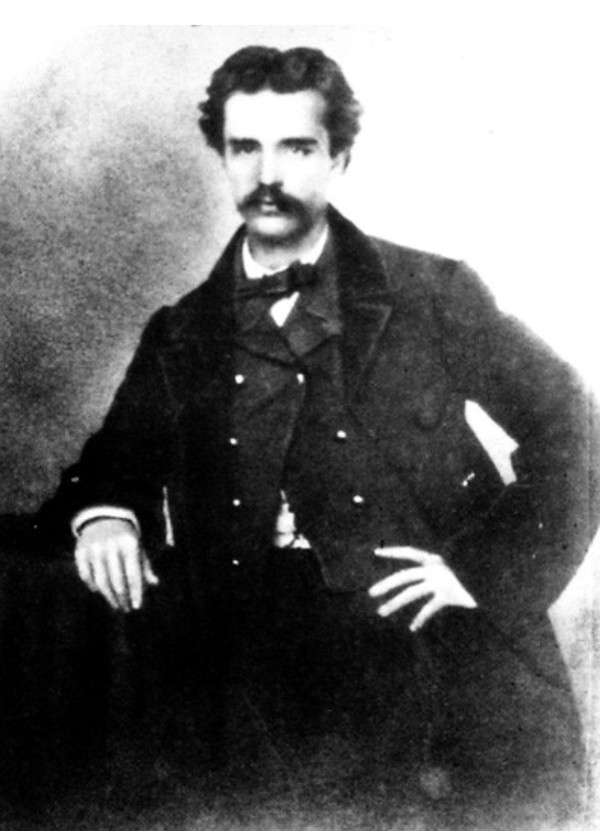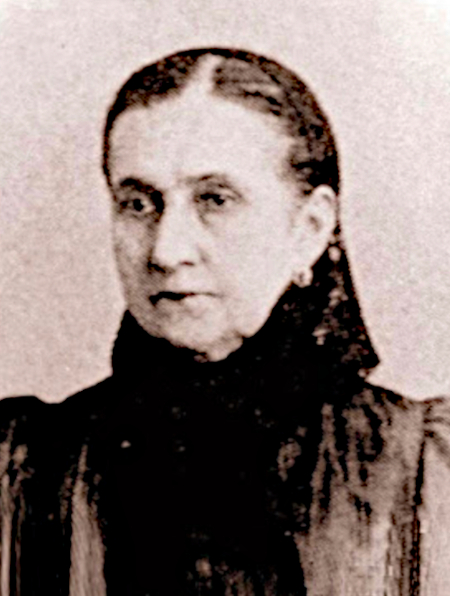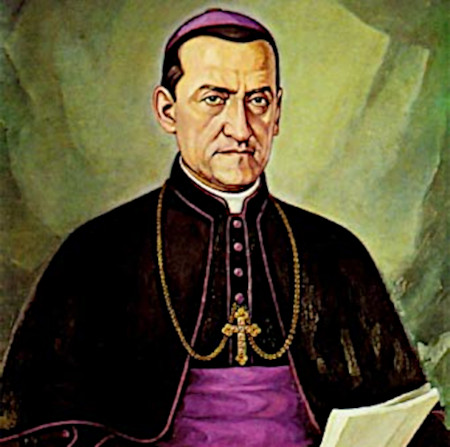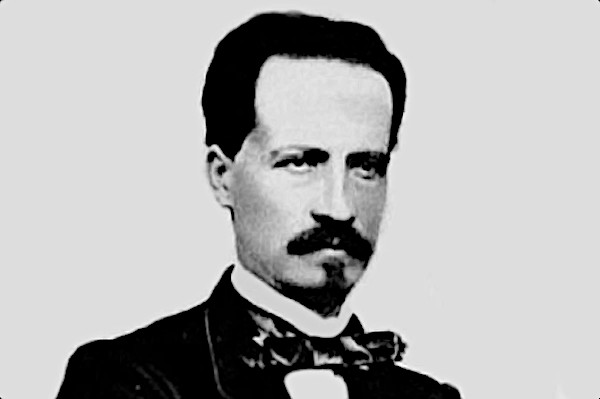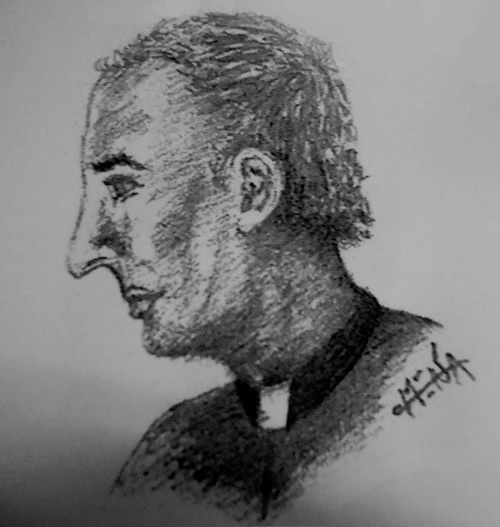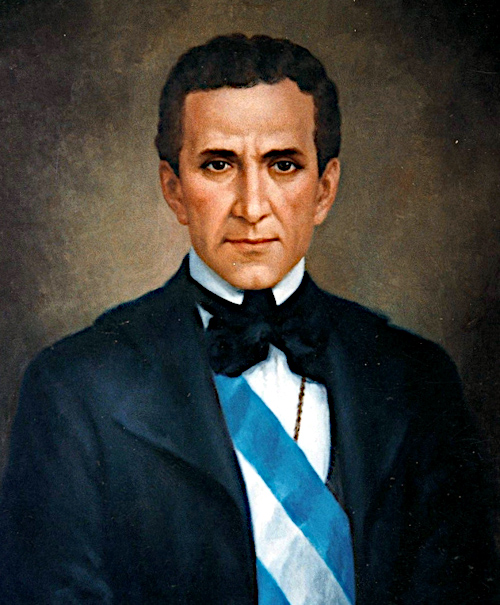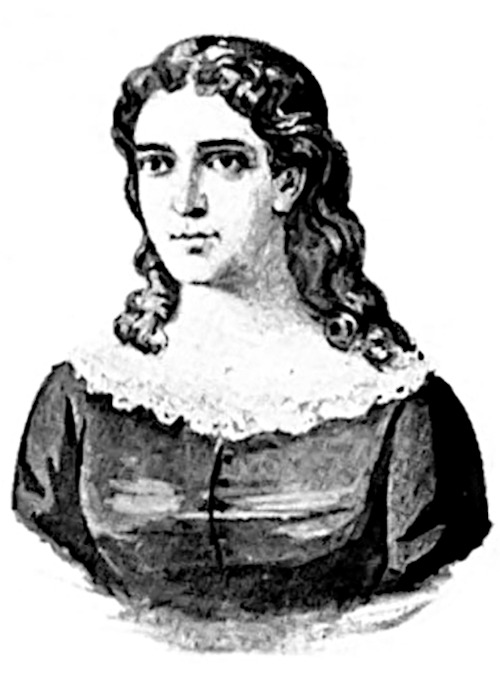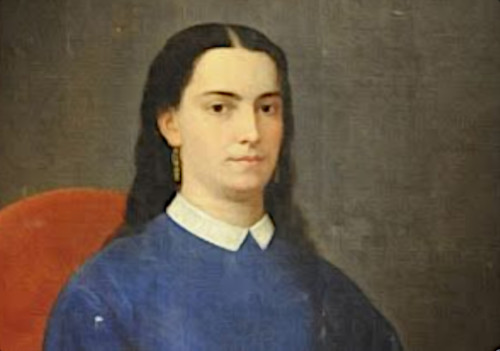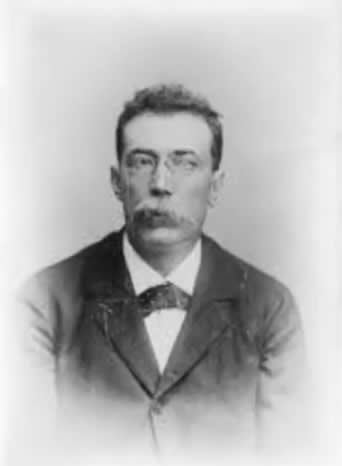Adolfo Hidalgo Nevares, sometimes spelled Nevarez, (Guayaquil, March 18, 1891 – Quito, 1934) was a doctor, writer and poet. Under the pseudonym Máximo de Bretal he wrote articles for El Guante magazine on topics such as politics, literature and poetry. He also wrote for El Telégrafo of Guayaquil and El Universitario of Quito. In 1920 he was appointed Deputy of Guayas. In 1925 he became a professor at the University of Guayaquil’s new Dentistry and Veterinary schools, and in 1926 he was named Minister of Public Education. He led a bohemian life and had an on and off again addiction to morphine which he sometimes used in the company of some of the members of the Decapitated Generation, a group of young Ecuadorian poets who died young by suicide. He too died by suicide in 1934, at the age of 43.
Continue reading “Adolfo Hidalgo Nevares”Category: 19th Century Writers
Nicolás Augusto González
Nicolás Augusto González Tola, also N.A. González (Guayaquil, April 14, 1858 – Buenos Aires, Argentina, January 18, 1918) was an Ecuadorian writer, playwright, novelist, journalist, poet, historian and diplomat. His plays in verse are among his best known works, which include, “Hojas secas,” “Entre el amor y el honor,” and “Amor y Patria,” which he co-wrote with Alfredo Baquerizo Moreno (President of Ecuador from 1916-1920). “Cuestión Histórica, el Asesinato del Gran Mariscal Ayacucho,” (written between 1887 and 1889), is perhaps his most important and controversial work, in which he accuses General Juan José Flores of being behind the assassination of Antonio José de Sucre, prompting hatred and persecution from Flores’ son Antonio Flores Jijón (President of Ecuador from 1888-1892). Due to his political views and polemic writing he was exiled to other countries, such as Peru, Colombia, Guatemala and Spain. From 1908-1913 he lived in Spain as a diplomat, and published there his poetry book, “Humo y cenizas” (1908) and his novel “La Llaga” (1908). He returned to Guayaquil in 1917 where a special committee chaired by José Luis Tamayo (President of Ecuador from 1920-1924) awarded him the “Golden Lyre”.
Continue reading “Nicolás Augusto González”Camilo Destruge
Camilo Destruge Illingworth (Guayaquil, October 20, 1863 – Guayaquil, February 26, 1929) was an Ecuadorian historian, journalist, and chronicler. He served as the first director of the Museo Municipal de Guayaquil, where he helped preserve the city’s historical artifacts, and he also directed the Municipal Library for many years. Destruge authored numerous historical works, including La Entrevista de Bolívar y San Martín (1918) and the five-volume Álbum Biográfico Ecuatoriano (1903–1905). He contributed to and edited various newspapers, such as El Telégrafo and La Nación. A member of the National Academy of History, he was also honored by the Venezuelan government with the Orden del Libertador. Declared “Cronista Emérito de la Ciudad” (Honorary Chronicler of the City), Destruge’s legacy is commemorated through a historical institution, a school, and a street named after him in Guayaquil.
Continue reading “Camilo Destruge”Víctor Manuel Rendón
Víctor Manuel Rendón Pérez (Guayaquil, December 5, 1859 – Guayaquil, October 9, 1940) was an Ecuadorian writer, poet, novelist, playwright, biographer, translator, doctor, diplomat, pianist, and composer. He wrote the novel Lorenzo Cilda in 1906 in French, later translating it into Spanish; in 1921, he was accepted into the Ecuadorian Academy of Language, and in 1925, the Académie Française awarded him a Gold Medal for the work. Rendón translated numerous works, including Olmedo, homme d’état et poète américain, chantre de Bolívar (1905), a French-language work combining a biography of José Joaquín de Olmedo with Rendón’s translations of Olmedo’s poetry. Fluent in four languages, Rendón published over forty books in Spanish and French, with works released in France, Spain, Belgium, Italy, Portugal, and Ecuador.
Continue reading “Víctor Manuel Rendón”Quintiliano Sánchez
Quintiliano Sánchez Rendón (Quito, April 13, 1848 – Ibidem, July 24, 1925) was a prominent literary figure in Ecuador, known for his contributions as a poet, novelist, journalist, translator, grammarian, and educator. His critical stance against the government of General Ignacio de Veintemilla, his directorship of the Ecuadorian Academy of Language, and his dedication to literature and education left a lasting impact. Through his captivating works, such as the novel “Amar con desobediencia,” his notable poetry like “Oda al Chimborazo,” and his translations of Latin classics, Sánchez Rendón demonstrated his artistic talent and linguistic prowess. His involvement in journalism and the founding of newspapers, along with his role as an influential teacher, further exemplified his multifaceted influence in shaping Ecuadorian literature and intellectual discourse.
Continue reading “Quintiliano Sánchez”Celiano Monge
Celiano Monge Navarrete (Ambato, December 15, 1856 – Quito, November 21, 1940) was an Ecuadorian poet, historiographer, journalist, politician, educator, and founder of various newspapers. He taught philosophy, rhetoric, mathematics and experimental physics in schools in Quito, Latacunga and Ambato. He occupied important positions within the teaching profession: he was the Director of Education of the Tungurahua and Pichincha Provinces; and later he was appointed Member of the Superior Council of Public Education. He was the secretary of the Ecuadorian Academy of Language and the director of the National Academy of History. In 1939 Monge was named “Ambato’s favorite son and official chronicler.”
Continue reading “Celiano Monge”Julio Zaldumbide Gangotena
Julio Zaldumbide Gangotena (Quito, June 5, 1833 – Ibarra, July 31, 1887) was an Ecuadorian poet and politician, recognized as one of the leading figures of 19th-century Romanticism in Ecuador. He began his literary career in 1852 with La Estrella de la Tarde and became known for his contemplative, nature-focused poetry, blending melancholic and philosophical themes. He was also involved in politics, serving as a Deputy and later as Minister of Public Instruction, where he advocated for liberal ideals. He was a founding member of the Ecuadorian Academy of Language. His works were posthumously collected and remain integral to Ecuadorian literature.
Continue reading “Julio Zaldumbide Gangotena”Rita Lecumberri
Rita Lecumberri Robles (Guayaquil, November, 14, 1831 – Guayaquil, December 23, 1910) was an Ecuadorian writer and educator. She was a published and awarded poet and essayist. She is also noted for her contribution to the education of women in Ecuador. She was director of the Escuela San Alejo in 1880-82 and 1882-95. A school, (El colegio Rita Lecumberri) is named after her as well as an award.
Continue reading “Rita Lecumberri”Federico González Suárez
Federico González Suárez (Quito, April 12, 1844 – Quito, December 1, 1917) was an Ecuadorian priest, historian and politician who served as the Archbishop of Quito for twelve years. Prior to becoming the Archbishop of Quito, he served as a senator in the Ecuadorian government in 1894 and then as the Bishop of Ibarra from 1895 to 1905. He wrote several books about the history of Ecuador, among them the book Historia General de la República del Ecuador, which is considered a masterpiece for its objectivity, painstaking research and erudition. He was not shy about criticizing the Church in Ecuador for abuses during the colonial period. The publication of the fourth volume of his history in 1894 was particularly scandalous since it uncovered the sexual liaisons of seventeenth-century Dominican friars in Quito. Although this work drew criticism from his superiors, he was ultimately vindicated, with the Vatican acknowledging the veracity of his analysis.
Continue reading “Federico González Suárez”Antonio Borrero y Cortázar
Antonio Borrero y Cortázar, born Antonio María Vicente Narciso Borrero y Cortázar (Cuenca, October 29, 1827 – Quito, October 9, 1911) was an Ecuadorian lawyer, politician, writer, and journalist who served as the President of Ecuador from 1875 to 1876. Known for his commitment to constitutionalism and civil liberties, Borrero was also an influential figure in Ecuadorian literature and journalism. He founded several newspapers, including La República and El Centinela, using them to advocate for political reform and decentralization. His notable literary works include a biography of Fray Vicente Solano and a refutation of a pro-García Moreno biography, reflecting his dedication to both intellectual and political life.
Continue reading “Antonio Borrero y Cortázar”Manuel Belisario Moreno
Manuel Belisario Moreno (Loja, 18?? – 1917) was an Ecuadorian writer and priest. Belisario Moreno is best known as the author of the novel Naya o La Chapetona (1900). He is the father of the sculptor Alfredo Palacio Moreno (1912-1998) and the grandfather of the former Ecuadorian President Alfredo Palacio González (in office 2005-2007).
Continue reading “Manuel Belisario Moreno”José Joaquín de Olmedo
José Joaquín de Olmedo y Maruri (Guayaquil, March 20, 1780 – Guayaquil, February 19, 1847) was a notable Ecuadorian poet, first mayor of Guayaquil, and former president of Ecuador. In his poetry, Olmedo emphasized patriotic themes. His best-known work is La victoria de Junín: Canto a Bolívar (1825; “The Victory at Junín: Song to Bolívar”), which commemorates the decisive battle won there by the forces of the liberator Simón Bolívar against the Spanish armies. It is considered by many critics the finest example of heroic poetry written in Spanish America.
Continue reading “José Joaquín de Olmedo”Dolores Veintimilla
Ignacia María de los Dolores Veintimilla de Galindo (Quito, July 12, 1829 – Cuenca, May 23, 1857) was an Ecuadorian poet and essayist known for her contributions to 19th-century Romanticism and early feminist thought. Raised in an aristocratic family, she received a formal education and later married Colombian physician Sixto Galindo. Her poetry, marked by themes of sorrow, unrequited love, and social justice, reflected her personal struggles and progressive views, including her opposition to the death penalty. Isolated and vilified for her outspokenness, Veintimilla tragically took her own life at the age of 27.
Continue reading “Dolores Veintimilla”Manuela de la Santa Cruz y Espejo
Manuela de la Santa Cruz y Espejo, also known by her pseudonym Erophilia in her articles (Quito, December 20, 1753 – Quito, 1829) was an Ecuadorian journalist, nurse, feminist, and revolutionary. She was the sister of Eugenio Espejo, with whom she discussed and shared Enlightenment and revolutionary, pro-revolutionary thought and ideas.
Juan Benigno Vela
Juan Benigno Vela Hervas (Ambato, July 9, 1843 – Ambato, February 24, 1920) was an Ecuadorian politician, lawyer, journalist, and writer. A key figure in Ecuador’s liberal movement, he was known for his staunch opposition to the conservative regimes of Gabriel García Moreno and Ignacio de Veintemilla. Despite losing his sight and hearing later in life, Vela continued his fight for civil liberties through his work in journalism and politics, contributing to the drafting of Ecuador’s 1906 Constitution. He founded several influential newspapers, including El Combate and El Espectador, and remained a vocal advocate for education and democracy throughout his life.
Continue reading “Juan Benigno Vela”